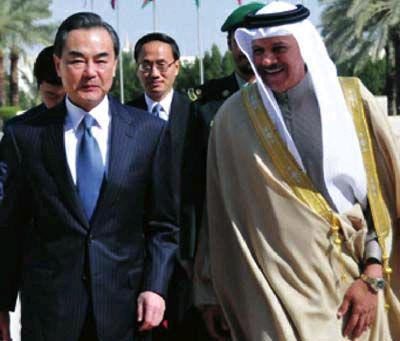Peace in the Middle East
2014-02-10ByDingYing
By+Ding+Ying
Chinese Foreign Minister Wang Yi took a tour of the Middle East and North Africa from December 17-26, 2013, consisting of stops in Palestine, Israel, Algeria, Morocco and Saudi Arabia. As the foreign minister commented, it was a visit in the name of “friendship, peace and cooperation.” With its growing strength and ability, China will be more capable of playing an increasingly influential role in the region.
According to Gao Zugui, a senior research fellow with the Party School of the Communist Party of China, the foreign ministers trip promoted Chinas relationship with countries and nations in the region. He believed that since China stresses a stance of upholding justice and playing an active and responsible role in Middle Eastern issues, its relations with the region are expected to warm up in the future.
China and Middle Eastern nations have maintained friendly cooperation, with continuously expanding communication and cooperation in areas such as politics, economy, security, culture and society. All of these have allowed them to lay a solid foundation for strengthening Chinas relationships in the region, Gao added.
Focal issues
China has reaffirmed the direction of further building its unique multi-dimensional diplomacy, and its relationships in the Middle East are a part of that diplomacy. The situation in the Middle East has been tense for a while, with thorny issues such as tensions between Israel and Palestine, the Syria crisis and Irans nuclear issue.
“China looks forward to peace in the Middle East and amity between the regions countries. We are also willing to make our own contributions to the situation and play a suitable role in promoting peace, stability, development and prosperity in the Middle East,” Wang said on December 19.
Wang reiterated Chinas stance on sen-sitive issues in the Middle East during his trip. One of his main tasks while there was to implement Chinas proposals toward the Palestine-Israel issue. In May, Chinese President Xi Jinping came up with four suggestions for solving the problem: heading in the right direction by acknowledging Palestine as an independent country and developing peaceful coexistence between Israel and Palestine; considering peace talks as a crucial part of the solution; insisting on principles such as “land for peace”; and providing a guarantee for advancing the peace process to international society.endprint
Wang expounded Chinas stance on the Syria issue. China insists that a political solution be found to the issue, as military action can only lead to harm to civilians. He announced that China will provide more emergent assistance worth 20 million yuan($3.13 million) to Syrian refugees to help them through the cold winter. He called for a ceasefire, relief for the spreading humanitarian crisis, strict implementation of the UN resolution to destroy chemical weapons, and political solution.
Wang reaffirmed Chinas stance of opposition toward Iran developing nuclear weapons, and its support for the building of a weapons of mass destruction-free zone in the Middle East. He also pleaded that both sides of the South Sudan conflict cherish their national interests and their peoples well-being, and that they stay calm and display self-control so as to settle their disputes in a peaceful way.
Wang stressed that China is willing to strengthen political and economic relationships with the Gulf Cooperation Council. China is looking forward to the establishment of a free trade zone with the organization, which consists of Bahrain, Kuwait, Oman, Qatar, Saudi Arabia and the United Arab Emirates. China will accelerate its open- ing up to Eurasian countries to its west. It has proposed the new Silk Road economic belt across Eurasia, as well as the Maritime Silk Road of the 21st century that will connect the Pacific, the Indian Ocean and the Atlantic. The two silk roads are likely to meet in the Middle East, Wang added.
Expanding role
Strengthening cooperation is absolutely necessary and also a natural consequence of the evolving relations between China and the Middle East, said Gao. China is now the biggest trade partner of the Middle East. Trade volume between China and Saudi Arabia reached $73.4 million in 2012, while that between China and the United Arab Emirates was $40 million. Global consultancy McKinsey and Co. predicted that trade between China and the Middle East will reach$350 billion to $500 billion by 2020.
Gao noted that the United States and Middle Eastern countries have experienced more and more disputes since the September 11 terrorist attacks in 2001. The regional situation has been in turmoil since the end of 2010. Washington has begun to shift its strategic focus from the Middle East to the Asia Pacific since President Barack Obamas inauguration in 2009. “The United States Middle Eastern policy has changed from complete domination to todays limited intervention. Both its willingness and ability to control the Middle East are decreasing,”Gao commented.endprint
At the same time, Middle Eastern countries like Israel and Saudi Arabia tend to stress their diplomatic independence. They show more interest and expectations when dealing with other countries with global influence such as China.
Gao noted that Wangs trip occurred at a crucial time for the Middle East. He explained that the Syrian crisis is expected to possibly find itself resolved politically during the coming international conference in Geneva in January, as the Bashar al-Assad administration expressed interest in coordinating with the UN to destroy its chemical weapons.
Irans nuclear issue is also heading toward a diplomatic settlement. Parties involved in the issue reached an agreement on November 24 as Iran promised to partially stop its uranium enrichment program while Europe and the United States lifted some of their economic sanctions against the country. Furthermore, peace talks between Israel and Palestine resumed in June 2013. On December 15, U.S. Secretary of State John Kerry announced that peace talks had made practical progress after more than 10 rounds of negotiations.
“Being the biggest trade partner of the Middle East, China will not play aloof as it undergoes political changes. Chinas expanding role in the region is an inevitable trend,”said Niu Xinchun, Director of the Institute of Middle East Studies at the China Institutes of Contemporary International Relations. “No countries can have the ability and ambition to replace the United States influence in the Middle East. Washington is still the biggest player in the region.”
Peace never comes easily. To obtain peace in the region, all related sides should make collaborative efforts. “Now the opportunity of peace once again returns to the region,” said Wang during his meeting with Israeli President Shimon Peres on December 19. “Peace requires efforts and it will not fall down by itself. We should work hard for peace and not just wait.”endprint
